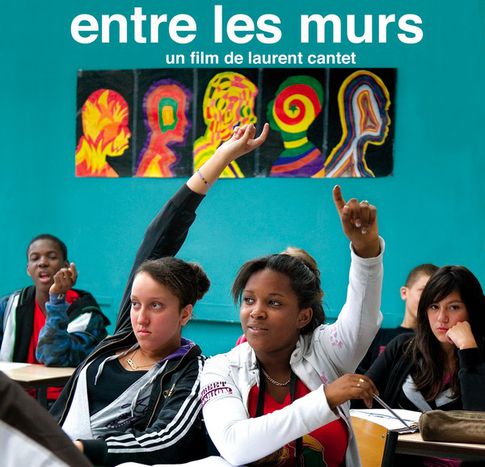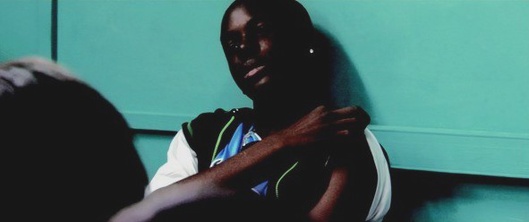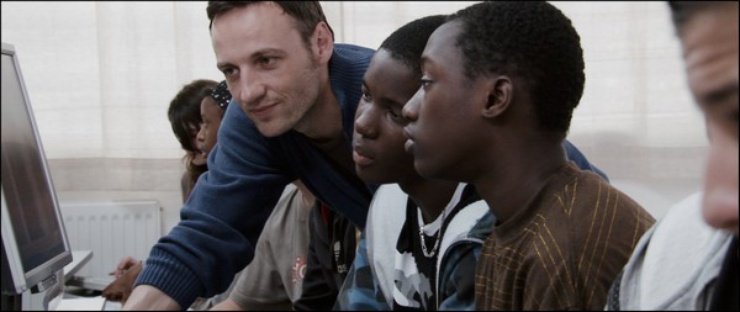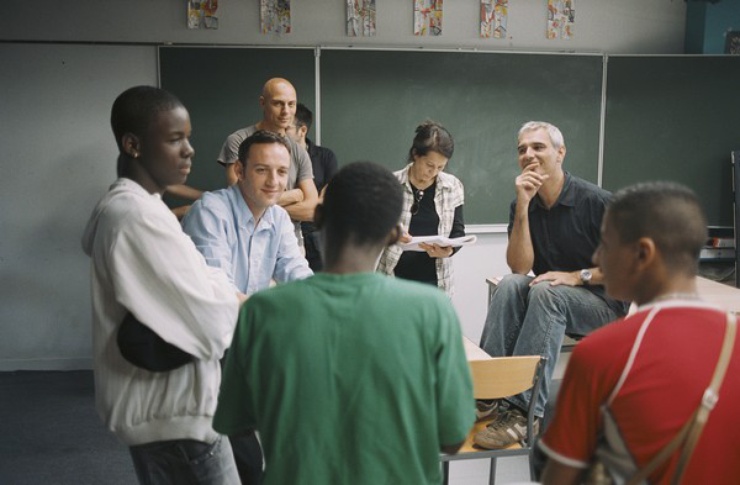
'The Class': France's 2008 Oscar nomination
Published on
Translation by:
 Andrew Christie
Andrew Christie
The documentary-style social study by French director Laurent Cantet is picking up prizes and nominations on the international film scene. Review of a film breaking with the multicultural dream
'If only the things you write in your exercise book were as intelligent as what you’ve tattooed on your arm,' retorts Monsieur Marin. In front of the quick-witted thirty-something teacher slouch pubescent pupils played by non-professional actors. The fourteen and fifteen year-olds have names like Esméralda, Wei and Souleymane, and loll about on the desks scattered around the room, feigning boredom and chewing gum. Pink dangly earrings, mouth braces, bling jewellery and footballer Zinedine Zidane are inspiring topics; the passé simple, Anne Frank and self portraits for the art class less so. 'Not even her grandad needs to know that stuff,' scoffs Khoumba, pointing at his classmate.
 Welcome to the Collège Françoise Dolto in the twentieth arrondissement, twentieth out of twenty districts in the east of Paris. This problem-school is the setting for the fly-on-the-wall documentary film Entre les murs (literally 'Between the Walls', English title The Class) by Laurent Cantet (Vers le Sud, 2005), which scooped the prestigious Palme d’Or at this year’s 61st Cannes Film Festival. The work provoked heated debate in France about cultural integration and came to represent the image of a typical French school. It has already been nominated for an Oscar at the next awards in February 2009. 'A truly magical film,' said American actor Sean Penn, who this year led the Cannes team, when explaining the jury’s decision.
Welcome to the Collège Françoise Dolto in the twentieth arrondissement, twentieth out of twenty districts in the east of Paris. This problem-school is the setting for the fly-on-the-wall documentary film Entre les murs (literally 'Between the Walls', English title The Class) by Laurent Cantet (Vers le Sud, 2005), which scooped the prestigious Palme d’Or at this year’s 61st Cannes Film Festival. The work provoked heated debate in France about cultural integration and came to represent the image of a typical French school. It has already been nominated for an Oscar at the next awards in February 2009. 'A truly magical film,' said American actor Sean Penn, who this year led the Cannes team, when explaining the jury’s decision.
The school day laid bare

However, The Class is anything but magic, and François Bégaudeau, the former teacher and punk rocker who wrote the novel of the same name and now plays himself in the film, anything but a magician. Cantet’s film can be frustratingly slow at times, but then so can the daily struggle in the classroom. By contrast, its back-and-forth dialogues are infectiously amusing – before you revert to tearing your hair out. Cotton-wool care or the cane? Bégaudeau and Cantet don’t offer a one-size-fits-all solution – this just wouldn’t work in the lively, multicultural class environment. The film does not set out to be sensational; nevertheless, it creates a stir.
The daily school routine and the teacher-pupil ding-dongs are remarkably convincing. In 2006 weekly improvisation workshops were organised at the Parisian school for pupils and teachers alike. Over time characters developed, such as the cheeky know-it-all Souleymane - who in real life is called Franck and is actually rather shy - which lent the film its crude charm. So, has the dream of multicultural education been shattered?

Multi what-y?
The fact that such issues as integration and violence in schools have long since become part of everyday life across Europe is evidenced by examples from other countries, as well as in Cantet’s cinema film. The Dutch journalist Margalith Kleijwegt caused a long-running sensation in her home country with her bestseller Schaut endlich hin! (Herder Verlag Gmbh, 2008). She spent a year researching the book in an Amsterdam problem-school. In 2006 teachers at the Rütli school in the Berlin district of Neukölln, 80% of whose pupils come from migrant backgrounds, were moved to write an open letter describing their despair at their school’s culture of violence.
So teachers are only human too? Are the broken dreams of multicultural education being portrayed by the ethnically mixed schools themselves? Does integration start in the classroom? What The Class manages to show so simply and so mundanely is that there are teachers in Europe who try each day afresh to explain to Esméralda, Souleymane and Khoumba the meaning of words like 'intuition'. On the other hand, however, it shows that there are pupils who educate themselves with a copy of Plato’s Republic; yet others still who find at the end of each school year that they have learnt nothing – literally nothing.
Catch the film in Europe: France (from 24 September), Italy (10 October), Portugal (30 October), Holland (27 November), Spain (9 January 2009), Germany (15 January 2009), UK (TBA)
Translated from Entre les murs: Klassen-Kampf in vier Wänden


